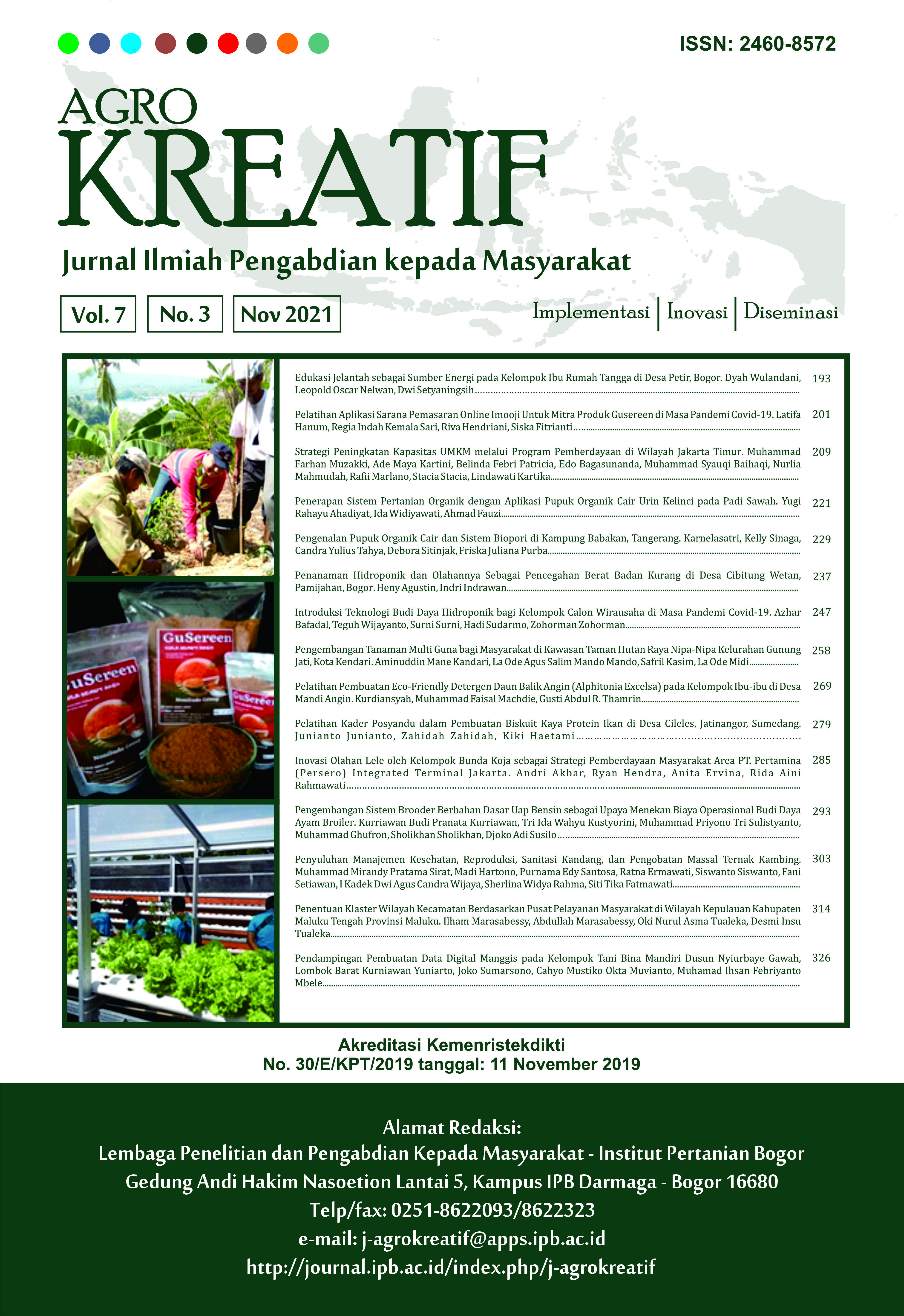Introduksi Teknologi Budi Daya Hidroponik bagi Kelompok Calon Wirausaha di Masa Pandemi Covid-19
Abstract
The purpose of this activity is to provide knowledge and skills for prospective entrepreneurs affected by the Covid-19 Pandemic in qualified hydroponic cultivation techniques. The method of implementing the activity is in the form of indoor training on the concepts and techniques of hydroponic cultivation. In addition, outdoor technical guidance is also carried out regarding the construction of hydroponic installations and cultivation practices, starting from making nutrition, sowing seeds, planting to harvesting. The method of field visits to successful hydroponic entrepreneurs is also carried out. Participants can properly follow the training materials and technical guidance on assembling installations and practicing hydroponic cultivation. The benefits and level of satisfaction of participants in participating in this activity reached a score of 8.75. This activity increases the interest of the training participants for hydroponic entrepreneurship. The condition of the harvested plants has not yielded the expected results, with yields still around 50% of the achievable potential. To ensure the sustainability of the activity and have a wider impact, the Konda Village Party should facilitate so that the participants of this activity can become tutors for other people who want to do hydroponic entrepreneurship.
Downloads
References
Berita Jakarta. 2020. Komunitas dasa wisma urban farming Pasar Baru panen 3,2 kilogram sayuran. [Internet]. [diunduh 2020 Juli 26]. Tersedia pada: http://www.beritajakarta.id/read/74828/komunitas-dasa-wisma-urban-farming-pasar-baru-panen-32-kilogram-sayuran#.Xx4kap4zZnI.
Bibitonline. 2020. 8 Kelebihan budi daya tanaman secara hidroponik. [Internet]. [diunduh 2020 Juli 26]. Tersedia pada: https://bibitonline.com/artikel/8-kelebihan-budi daya-tanaman-secara-hidroponik.
Budastra IK. 2020. Dampak sosial ekonomi covid-19 dan program potensial untuk penanganannya: studi kasus di Kabupaten Lombok Barat. Agrimansion. 21(1): 48–57. https://doi.org/10.29303/agrimansion.v21i1.321
Chawla Y, Chodak G. 2021. Social media marketing for businesses: Organic promotions of web-links on facebook. Journal of Business Research. 135: 49–65. https://doi.org/10.1016/j.jbusres.2021.06.020
Chen H, Tong X, Tan L, Kong L. 2020. Consumers’acceptability and perceptions toward the consumption ofhydroponically and soil grown broccoli microgreens. Journal of Agriculture and Food. 2:1–6. https://doi.org/10.1016/j.jafr.2020.100051
Distan Sukabumi. 2020 Kelebihan dan kekurangan bercocok tanam hidroponik. [Internet]. [diunduh 2020 Juli 27]. Tersedia pada: https://distan.sukabumikota.go.id/kelebihan-dan-kekurangan-bercocok-tanam-hidroponik/#:~:text=Kelebihan%20sistem%20hidroponik% 20antara%20lain% 3A&text=Tanaman%20berproduksi%20tanpa%20menggunakan%20tanah, hama%20dan%20penyakit%20lebih%20mudah.
Eikbuikwem PN, Mierzwa JC, Saroja DP. 2020. Assessment of suspended growth biological process for treatment and reuse of mixed wastewater for irrigation of edible crops under hydroponic conditions. Agricultural Water Management. 231: 1–12. https://doi.org/10.1016/j.agwat.2020.106034
Jacobson J, Gruzd A, Hernandez-Garcia AA. 2020. Social media marketing: Who is watching the watchers?. Journal of Retailing and Consumer Services. 53: 1–12. https://doi.org/10.1016/j.jretconser.2019.03.001
Kholis MN, Fraternesi, Wahidin LO. 2020. Prediksi dampak covid-19 terhadap pendapatan nelayan jaring insang di Kota Bengkulu. Albacore. 4(1): 1–11. https://doi.org/10.29244/core.4.1.001-011
Kilmanun JC, Ndaru RK. 2020. Analisis pendapatan sayuran hidroponik di Malang Jawa Timur. Jurnal Pertanian Agros. 22(2): 180–185.
Mahi M, Mobin MA, Habib M, Akter S. 2021. A bibliometric analysis of pandemic and epidemic studies in economics: future agenda for Covid-19 research. Social Sciences & Humanities Open. 4: 1–12. https://doi.org/10.1016/j.ssaho.2021.100165
Roidah IS. 2014. Pemanfaatan lahan pekarangan menggunakan sistem hidroponik. Jurnal Universitas Tulung Agung BONOROWO. 1(2): 43–49.
Sina PG. 2020. Ekonomi rumah tangga di era pandemi. Journal of Management. 12(2): 239–254. https://doi.org/10.35508/jom.v12i2.2697
Swardana A. 2020. Optimalisasi lahan pekarangan sebagai salah satu upaya pencegahan krisis pangan di masa pandemi covid-19. JAGROS. 4(2): 246–258. https://doi.org/10.52434/jagros.v4i2.922
Tallei TE, Rumengan IFM, Adam AA. (2017). Hidroponik Untuk Pemula. Manado (ID): UNSRAT Press.
Tonnessen O, Dhir A, Flaten BT. 2021. Digital knowledge sharing and creative performance: Work from home during the Covid-19 pandemic. Technological Forecasting & Social Change. 170: 1–13. https://doi.org/10.1016/j.techfore.2021.120866
Wahyuningsih A, Fajriani S, Aini N. 2016. Komposisi nutrisi dan media tanam terhadap pertumbuhan dan hasil tanaman pakcoy (Brassica rapa L.) sistem hidroponik. Jurnal Produksi Tanaman. 4(8): 595–601
This work is licensed under a Creative Commons Attribution-NonCommercial 4.0 International License.



















